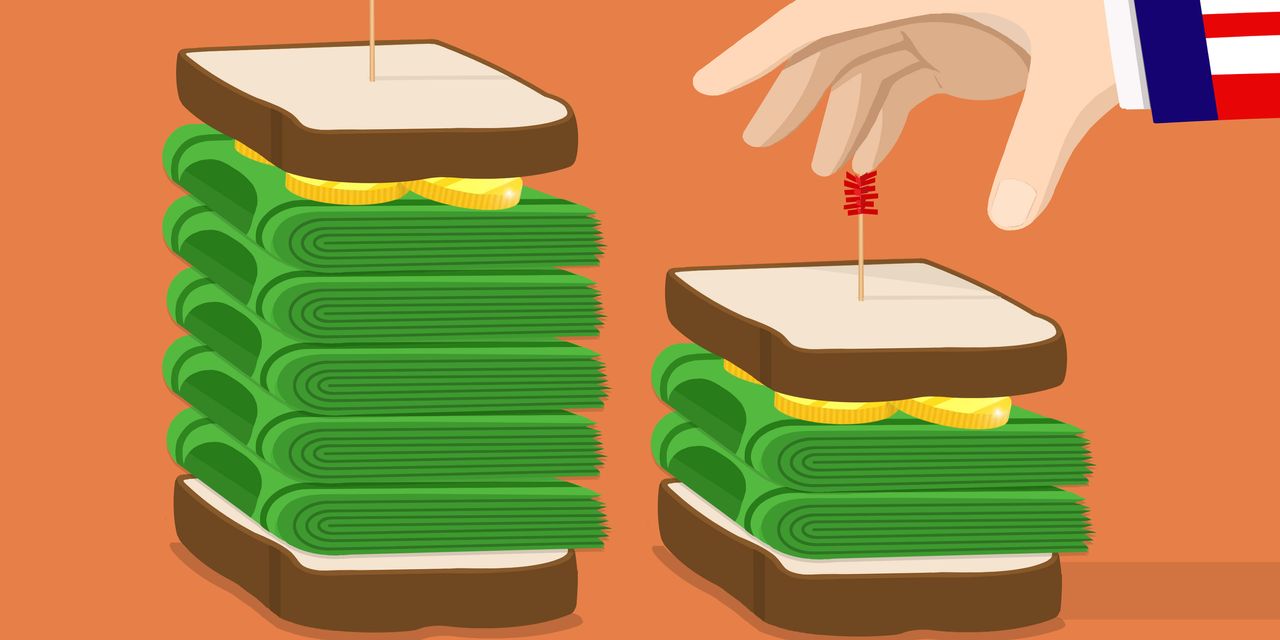
It hasn’t been noticed much, but proposed changes to capital-gains taxes have good news for some of the highest-earning Americans and bad news for those earning between $400,000 and $1 million.
The good news, for the highest earners: The House Ways and Means Committee didn’t adopt the Biden administration’s proposal to raise the top rate on long-term capital gains to 43.4% for people with income of $1 million or more. That would have been a huge increase over the current top rate of 23.8%, which consists of a 20% rate plus a 3.8% surtax for many. (Long-term gains are those on sales of assets held longer than a year.)
Instead, the House tax writers proposed raising the 20% rate to 25% and retained the 3.8% surtax, bringing it to 28.8%. They also added a 3% surtax for those with income of $5 million or more, but that will affect few Americans.
But here’s the rub: The proposed 28.8% rate would kick in at $400,000 of taxable income for single filers and $450,000 for married joint filers. That’s around $50,000 below the thresholds for the current 23.8% top rate, which are $445,851 for single filers and $501,601 for married joint filers.
This is the bad news for people with income in the $400,000 to $1 million range—even if it’s from a one-time windfall like the sale of a home or business.
For many sellers of small businesses, the rate on part of their gain would rise to 28.8% from 15%, according to Matt Foltz, a manager with Chicago-area wealth-advisory firm BDF who works with small-business owners. Owners who are active in their firm typically haven’t owed the 3.8% surtax on a gain from a sale, but another provision in the House bill would apply it in some cases, beginning next year.
This is a complex area. But Mr. Foltz estimates an owner with about $150,000 of annual taxable income from a business who sells the company for $1 million of capital gain could owe $245,000 of capital-gains tax and surtax under the Ways and Means bill. That is versus $182,000 under current law.
These owners often have scant retirement savings because they have reinvested profits in the business, adds Greg Will, a planner at Bestgate Wealth Advisors in Maryland.
“The capital-gains tax increase meant for the ultrawealthy could have a substantial impact on the retirements of middle-class business owners,” he says.
The proposed increase could also raise taxes for sellers of long-held homes in expensive areas like Boston, New York City and San Francisco. It would kick in if gains exceed the home-sellers’ exemption of $250,000 for single filers and $500,000 for married joint filers and the sellers’ total taxable income is above the $400,000/$450,000 thresholds.
Charlie Oppler, a longtime broker based in Ridgewood, N.J., and current president of the National Association of Realtors, says many of his firm’s clients have annual income well below $400,000 and gains on home sales far greater than the exemptions.
“I was surprised the Ways and Means bill reached so far below the president’s $1-million limit,” he says. “It would especially hit widows and widowers who only get a $250,000 exemption.”
The tax-rule change would take effect for transactions after Sept. 13, the date the proposal was introduced, unless the seller had a binding contract by then. (There are often such cutoffs with capital-gains changes, to prevent gamesmanship.)
What can affected taxpayers do, beside talking to lawmakers or trade associations? Here are options to consider.
Watch and wait
Neither the full House nor the Senate has acted on the Ways and Means provisions; there could still be major changes.
For example, lawmakers could help home sellers by moving the proposed thresholds higher. Less likely is an expansion of the $250,000/$500,000 exemption, which was enacted in 1997 and isn’t indexed for inflation. They could even ditch the Ways and Means proposal, as the House tax writers seem to have done with the administration’s proposal to tax capital gains at death.
Gamble on good news
It’s possible, if unlikely, that lawmakers will delay the Sept. 13 effective date. Sellers who have acted by any new cutoff date could be eligible for the prior rates.
For example, President Biden’s April proposals said that sellers with income of $1 million or more would face a top rate of 43.4% after the introduction date. Yet some who sold after that lucked out, as sales on or before Sept. 13 now qualify for a 23.8% top rate.
Prepare to manage large gains
If Congress lowers the thresholds for capital-gains rates, consider spreading out gains to avoid higher brackets.
Meg Bartelt, an adviser with Flow Financial Planning near Seattle with many clients who are women in tech, says they often earn less than $400,000 a year but have company stock. While a $1 million capital-gains threshold wouldn’t complicate planning for most, a $400,000 threshold would.
These investors may want to take gains this year, if it helps them stay below a $400,000 or $450,000 threshold in the future.
SHARE YOUR THOUGHTS
How are you preparing for potential changes in your 2021 tax bill? Join the conversation below.
“There may be no downside to accelerating a planned sale if it doesn’t raise their tax rate this year and saves them from a higher one next year,” she says.
Home sellers can’t spread out gains, but they could avoid taking other gains in the year of a sale. They can also research every dollar spent on home improvement, as such expenses can lower taxable gains by raising the home’s cost basis.
Charitably minded investors with large one-time gains may want to bunch several years of deductions to lower taxable income, perhaps in a donor-advised fund.
Maintain perspective
Taxes affect investment returns, but they’re only one factor. Jody King, director of wealth planning at Boston’s Fiduciary Trust, is adamant: “An investment thesis, not taxes, should drive a sale.”
Or as the adage says: “Never let the tax tail wag the dog.”
Write to Laura Saunders at [email protected]
Copyright ©2021 Dow Jones & Company, Inc. All Rights Reserved. 87990cbe856818d5eddac44c7b1cdeb8








